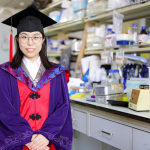Zhenpeng Luo: The Plant Cell First Author

 Zhenpeng Luo, first author of “The small peptide CEP1 and the NIN-like protein NLP1 regulate NRT2.1 to mediate root nodule formation across nitrate concentrations”
Zhenpeng Luo, first author of “The small peptide CEP1 and the NIN-like protein NLP1 regulate NRT2.1 to mediate root nodule formation across nitrate concentrations”
Current Position: Ph. D. candidate
Education: Ph.D. in Genetics, CAS Center for Excellence in Molecular Plant Sciences (CEMPS), University of the Chinese Academy of Sciences (UCAS).
Non-scientific Interests: Playing football, Gardening
Brief Bio: I was admitted to CAS Center for Excellence in Molecular Plant Sciences as a graduate student in September 2016. My supervisor was prof. Fang Xie. I majored in Plant Genetics and my project mainly focused on studying how legume plants regulation of nodule symbiosis in response to nitrate.
Our previous studies have shown that nitrate can regulate nodule number via local and systemic regulatory pathways (Lin et.al., Nat Plants, 2018, 4:11, Luo et.al., Plant Commun, 2021, 2:100183, New Phytol, 2022, 234:5). MtNLP1 plays a central role in these two pathways. However, the mechanism of nitrate uptake by legume plants and its effect on nodulation is still largely unknown.
In this study, we found that the nitrate transporter MtNRT2.1 is required for optimal nodule formation under low nitrate and for the repression of nodulation when nitrate is replete in Medicago truncatula. Isotopic labeling and electrophysiological assays showed that MtNRT2.1 has the ability to transport low and high concentrations of nitrate. Further we found that MtNRT2.1 is activated through MtCEP1/MtCRA2 systematic pathways under low nitrate, and mediated low nitrate to promote nodulation. Under high nitrate conditions, MtNRT2.1 is induced by MtNLP1 and mediated high nitrate inhibition of nodulation. These results indicate that MtNRT2.1 is one of the key components of nitrate regulating nodule symbiosis.
姓 名: 罗振鹏
目前职位: 在读博士研究生
教育背景:中国科学院分子植物科学卓越创新中心,中国科学院大学,遗传学,博士
兴趣爱好: 踢足球、园艺
个人简介: 本人于2016年9月进入中国科学院分子植物科学卓越创新中心攻读博士学位。研究生期间师从谢芳研究员, 专业为植物遗传学,研究方向为硝酸盐调控豆科植物根瘤共生的分子机制。
我们之前的研究表明,硝酸盐可以通过局部和系统性途径调节根瘤数目,转录因子MtNLP1在这两种途径中都起着核心调控的作用(Lin et.al., Nat Plants, 2018, 4:11, Luo et.al., Plant Commun, 2021, 2:100183, New Phytol, 2022, 234:5)。然而硝酸盐如何被植物吸收进而影响结瘤的机制还不清楚。
在本研究中,我们发现蒺藜苜蓿硝酸盐转运蛋白MtNRT2.1具有介导低浓度硝酸盐促进结瘤和高浓度硝酸盐抑制结瘤的双重功能。同位素标记和电生理实验表明,MtNRT2.1具有转运低浓度和高浓度硝酸盐的能力。进一步的研究发现,在低浓度硝酸盐条件下,MtNRT2.1受MtCEP1/MtCRA2所介导的系统性途径的诱导表达,调控低浓度硝酸盐促进结瘤。而在高浓度硝酸盐条件下,MtNRT2.1受MtNLP1的诱导,介导对高浓度硝酸盐的吸收从而抑制结瘤。这些结果表明MtNRT2.1是硝酸盐影响根瘤共生的关键组分之一。



